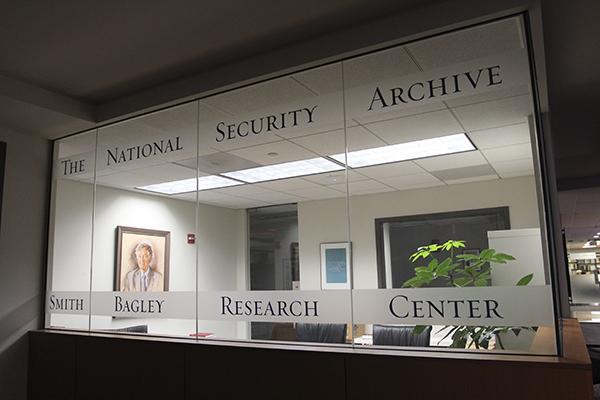Filing for the Freedom of Information Act can be like solving a puzzle, and only some people are dedicated enough to work years to find the solution.
As they face constant media attention, researchers at the National Security Archive, housed in Gelman Library, are uncovering new details about current issues like the Chiquita banana scandal and the U.S. nuclear non-proliferation policy through a relentless pursuit of government documents.
The group’s analysts and fellows regularly file FOIA requests, which allow citizens to access public records. Over the years, the group has become increasingly accessible through social media and this year, its website will be overhauled to be even more user-friendly.
The researchers have recently made headlines for helping to uncover documents that reveal government secrets. Journalists and scholars created the archive in 1985 to serve as a research institute, investigative journalism hub and library of declassified documents.
William Burr, a senior analyst in the archives, said when the archives started out, there was no Internet, making it difficult for the public to access the documents. He said the online database – which includes items like electronic briefing books and blogs – has made it possible for more people to have access to declassified documents.
Burr said professors use the website as part of their courses, and the information can be a helpful resource for journalists and academics.
“All we can do is contribute to the discussion and make resources more widely available so that people can use them,” Burr said.
Burr said requesting information through FOIAs is always a surprise because he never knows what he will receive. He said he works specifically with U.S. nuclear weapons policy and said it is important to know as much as possible because “since 1940, the U.S. government has spent trillions of dollars in taxpayer’s dollars on a tremendously deadly and destructive weapon.”
“Because significant elements of the nuclear program have been shrouded in secrecy for years, it is important to make declassification requests to government agencies to shed as much light as possible on important elements of U.S. government nuclear policy,” he said.
Joyce Battle, a senior analyst and director of publications, said in an email that social media activities and frequent blog updates often attract media and public interest. Battle added that the archives are used to advocate for government transparency and accountability, both in the U.S. and abroad.
Battle said that recent popular postings on their blog, ‘Unredacted,’ include an online briefing book containing documentation on Area 51 and a publication of the CIA’s role in the 1953 overthrow of the Iranian prime minister. She said each analyst works on individual projects and covers a range of topics.
“We create collections of documents of high interest,” Battle said. “Each analyst at the archive works on an individual project or projects, most often focused either on U.S. policy toward a particular part of the world, or on categories of records that are particularly revelatory about aspects of policy.”
Michael Evans, an analyst in the archives, said the archives have seen a shift over the years from in-person visits to more online traffic. Evans said the website will soon undergo an overhaul to make more items digitally available and relevant to ordinary people.
Evans said that he currently directs the archive’s Colombia Project and Mexico Migration Project. He said he tries to focus on current issues in his projects and solving redactions, text that has been edited out or censored by the government, in documents can be like a strategic game.
“We are constantly trying to stay on the cutting edge on what is declassified,” Evans said. “There are a lot of things that are kept secret that should not be secret.”
The Latin America programs have transitioned to become more focused on human rights, Evans said. After years of a long legal struggle, he said that analysts were able to obtain information about the Chiquita banana company and a massive collection of the company’s internal memos documenting illegal payoffs to Colombian guerrilla and paramilitary groups that can be used in pending civil lawsuits.
“There are a lot of people who, including myself, have worked here for a long time, and that is because it really pays to invest yourself and to invest time in this and stick around for these requests to bear fruit,” Evans said.







